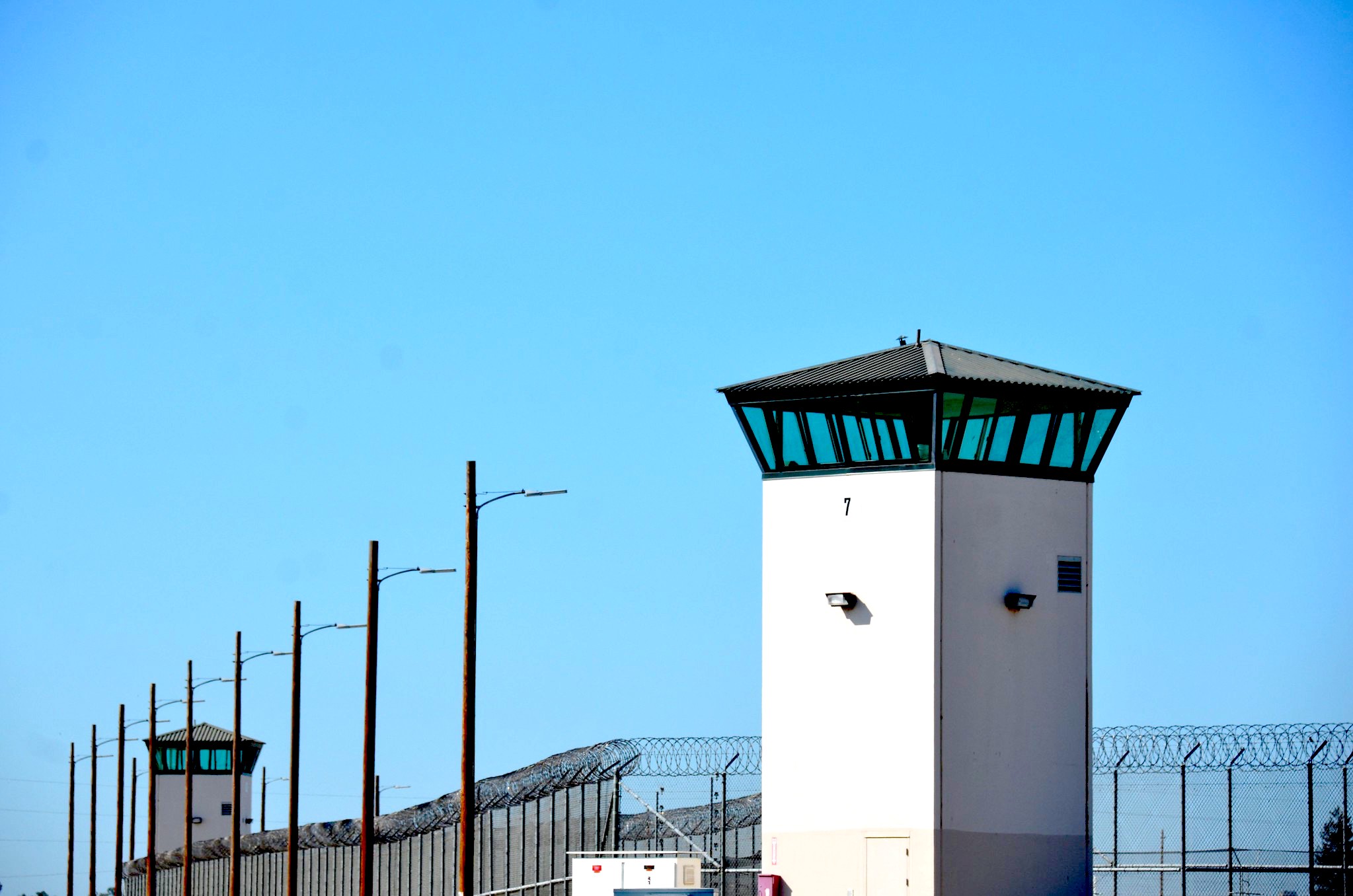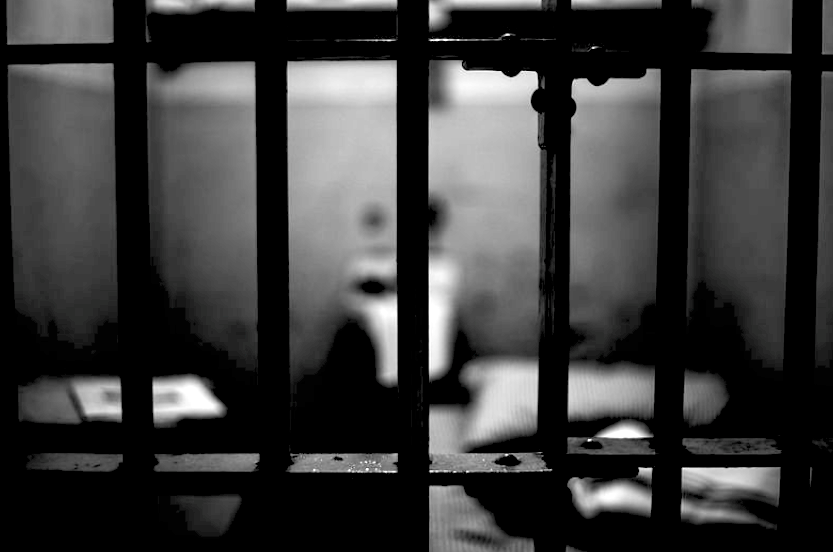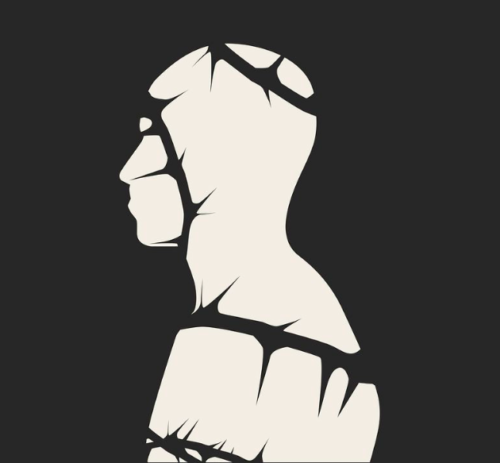Most states have at least considered initiatives to do away with, or to reduce the use of, isolation in their prison systems, according to the latest major report on the subject. But there’s bad news too.

Guard towers at Corcoran State Prison, California. (Steve Rhodes/Flickr, CC BY-NC-ND 2.0)
By John Kiriakou
Special to Consortium News
 In prisons and jails across America, between 41,000 and 48,000 people are currently being held in solitary confinement, or “isolation,” as it is called in a new study by the Correctional Leaders Association and the Arthur Liman Center for Public Interest Law at Yale University Law School.
In prisons and jails across America, between 41,000 and 48,000 people are currently being held in solitary confinement, or “isolation,” as it is called in a new study by the Correctional Leaders Association and the Arthur Liman Center for Public Interest Law at Yale University Law School.
Those numbers are too high, especially when the United Nations’ special rapporteur for torture has called the U.S. practice of using solitary confinement as a punishment a form of torture. Still, as high as the numbers are, they are far lower than they were in 2014. And there is growing support across the country for solitary confinement reform.
Over the course of a decade the Correctional Leaders Association and the Liman Center have published six reports based on prison officials’ responses to surveys about their use of solitary confinement. Together, these reports represent the only comprehensive look at the use of solitary across the country.
The most recent report, completed in 2022, but only just released, shows that the use of solitary confinement is decreasing, while a desire for reform of the system within prisons and state Departments of Corrections is increasing. The report defines “isolation” as when a prisoner is held in solitary confinement for at least 22 hours a day and for at least 15 consecutive days. The Correctional Leaders Association is a national professional group made up of the chief executive officers of every state prison system in America.
Good & Bad News

(Rawpixel/Public domain)
First the good news: For the first time, three states — Delaware, North Dakota and Vermont — reported having no prisoners in solitary confinement. Colorado reported having only four people, while Maine reported eight. Ten states reported no women in solitary confinement. All 50 states, as well as the federal Bureau of Prisons, reported declines in the population of prisoners being held in solitary since 2014, when the total number fluctuated between 80,000 and 100,000.
And now the bad news: A majority of prisoners in solitary are there because they have “serious mental illness” and are consequently unable to live in a prison’s general population, having been deemed a threat to themselves or to others. Furthermore, African-Americans make up 30 percent of those in solitary, while they are 20 percent of the overall population of incarcerated Americans and 13.6 percent of the U.S. population.
Still, the overall news is good. Most states have at least considered initiatives to do away with, or to reduce the use of, solitary in their prison systems. Between 2018 and 2020 legislators in 25 states introduced bills to limit the practice; 15 of those states enacted legislation. Since 2020, legislators in 30 states have introduced bills to restrict the use of solitary, while several state courts have ruled that specific forms of solitary are unlawful.
Making Mental Illness Worse

(Rawpixel, Public domain)
A large body of medical evidence proves that solitary confinement causes adverse psychological effects and worsens existing mental health problems. Humans require social interaction. The stress of isolation, over time, leads to a wide range of mental health problems, including anxiety, stress, depression, anger, panic attacks, paranoia, psychosis and even self-harm or suicide.
The New York Times Magazine in 2015 reported that solitary confinement is commonly used in lieu of mental health treatment, that prisoners who already suffer from depression, schizophrenia, or other mental illnesses are twice as likely to be sent to solitary as prisoners who do not have mental health problems, and that the average stay in solitary for those mentally ill prisoners was 647 days.
Many states don’t curb the length of time that prisoners can be sent to solitary. In South Carolina, for example, Tyheem Henry received 37.5 years in solitary for posting on Facebook from prison in violation of state Department of Corrections rules. That was in addition to the 15 years that he was already serving for aggravated assault.
In Illinois, Anthony Gay had a minor assault charge for punching a teenager, stealing a dollar from him, and taking his hat. A parole violation on his seven-year suspended sentence eventually landed him in a state supermax prison, where his mental illness kicked into overdrive. After throwing feces at a guard through the food slot in the door of his cell, a fairly common action by severely mentally ill prisoners, his sentence was extended to 97 years, all of which will be in solitary confinement.
Imagine being insane and spending the rest of your life in an 8-by-10 foot concrete box. Nobody can survive that.
It’s great that state legislatures are slowly coming around on the evil that is solitary confinement. Perhaps next they can address the equally pressing need for real and well-funded assistance for mental health. Don’t hold your breath.
John Kiriakou is a former CIA counterterrorism officer and a former senior investigator with the Senate Foreign Relations Committee. John became the sixth whistleblower indicted by the Obama administration under the Espionage Act—a law designed to punish spies. He served 23 months in prison as a result of his attempts to oppose the Bush administration’s torture program.
The views expressed are solely those of the author and may or may not reflect those of Consortium News.

“Imagine being insane and spending the rest of your life in an 8-by-10 foot concrete box. Nobody can survive that.”
Yes, and if anyone needs their imagination stimulated, they should read “Hell Is a Very Small Place: Voices from Solitary Confinement,” edited by Jean Casella, (the late) James Ridgeway and Sarah Shourd and published by The New Press in 2016. There is nothing like reading testimony from the victims themselves.
The viciousness and cruelty of these people are sickening to think about.
Meanwhile just imagine the money generated by such a system if it is one of those for profit horrors.
A study of the money spent for this torture might get peoples’ attention?
Thanks for keeping up with the darkest side of our our culture/economy.
WHY WHY WHY are we this way….
We think we’re exceptional.
We’re just exceptionally mean and dumb.
Thank you. You are one of the humane and courageous people in this sick world.
The Land of the Free has one quarter of the world’s prison population. Wrap your head around that if you want to understand America. The only possible answer is that America is not what it claims to be.
What will really get the Establishment scared is if you start asking what else that you’ve been told that is not true? If the Land of the Free is actually the world’s leader in UnFreedom, what else in America is not what it proclaims itself to be? When we hear the word Freedom, we often also hear the word Democracy, so that might be another place to look and see if America is not perhaps a leader in UnDemocracy as well? Is America a land where the will of the people always sets the course of the nation, or do 70% of Americans say that the nation is going in the wrong direction, and that elections somehow fail to change that direction? Then, you knows where you might go with this train of thought.
Which is why the Establishment of the Land of the Free does not like Consortium News very much.
Exceptional Comment Ms. Crown!
Thanks So much!
(& tnx CN… Direct Communication between concerned individuals IMO Defines True Internet Spirit… read: FREEDOM SHARED!)